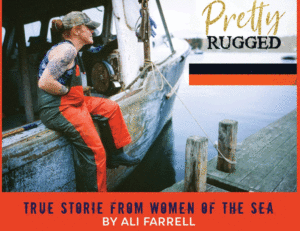Pretty Rugged: True Stories From Women of the Sea
By Ali Farrell (Sea Street Publishing, Camden; 2020)
Review by Tina Cohen
This is a book about women who lobster, and it is about the grit of these fishermen (the term has become gender-neutral). Nothing is prettied up here. Author Ali Farrell interviewed 26 women working in Maine who share their insights and experience.
Navigational aids like a table of contents are curiously missing so we don’t easily know who is profiled, and a map showing their home ports would have been helpful, too. Each interview includes photographs, personal stories, and facts about the work. The women range in age, culminating with 100-year old Virginia Oliver of Spruce Head.
Now, many are hiring female crew and bringing onboard their family members.
Most of the women here are captains; one also raises oysters and another grows kelp. And there are a lot of moms, some raising kids on their own. Genevieve McDonald captains her boat out of Stonington but might be familiar because of her other gig, a member of the Maine House of Representatives. Eighteen harbors are represented, spread between the Midcoast and Downeast, including many islands.
Lobstermen who captain boats typically own their vessel and have a lot of training before becoming licensed. They steer, chart a course, haul traps, and know some engine repair and boat maintenance.

Genevieve McDonald’s fishing career was born from a bar bet. In her profile, she expounds on her experience. “My fellow fishermen have treated me the same way they would any other crewman or captain. Where it becomes obvious I am a woman in a male-dominated industry is off the water.”
She experiences sexism in the “institutions that surround fishing: the loan officer who denied my first boat loan after stating he wasn’t sure I was serious about fishing and should use my college degree; every salesman who has looked past me at a trade show; the marine patrol officer who answered my questions as though I had never set foot on a boat; the reporters who only wanted to talk about my gender and not the issues the fishing industry is facing; every time someone assumed I was the crew, and not the captain, of my vessel.”
She concludes: “The women and men who work in the fisheries treat each other with respect and appreciation, and those who service the industry ought to as well.” In frustration, she started a social media project dubbed Chix Who Fish and heard from over 400 women. Foul weather gear, designed for men and fitting women poorly was one common complaint. After voicing that to Grundens, in 2014 the company released a women’s line of gear. McDonald saw it as “recognition women were a significant part of their market.”
We hear from Yvonne Rosen of Vinalhaven, known as Beba, who reflects on what it means to her to be a captain: “It’s more than a lifestyle, it’s my life. It’s about the only thing that really brings me real joy, being out on my boat working. I’ve proved myself and I’ve earned the respect of my fellow fishermen by just working hard and respecting the ocean and the industry.”
Lobstermen sometimes indulge in pranks, and while some jokes smack of male locker room humor, the women find ways to handle it—literally. Beba remembers finding an inflatable doll floating in the water. In the spirit of sharing an impressive catch—say, a blue lobster—she took it to the buying station where it was promptly put on display, gaining an appreciative audience.
“They all got a good laugh. It stayed up for a long time too.”
Another important quality for lobstermen is resilience. They are witnessing a warming ocean, government regulations that could limit fishing, and international politics that can impact tariffs and trade deals. And the work is dangerous. Farrell reminds us that commercial fishing is the “deadliest job in the U.S.
Hopefully some lucky girls will have this book come their way, with its empowering attitude so enthusiastically conveyed. But anyone curious about this life will find the coverage interesting. No recipes are included, but plenty of incentive to enjoy lobster.
The book is available for purchase on Amazon and PrettyRuggedBook.com.
Tina Cohen is a seasonal resident of Vinalhaven.




